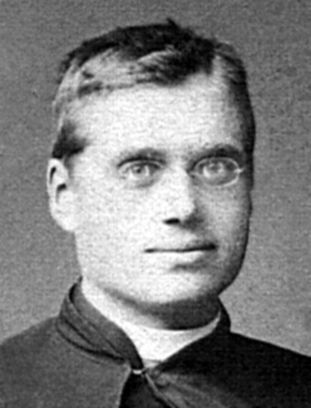View entry
Name: ROHMER, Martin

Birth Date: 7.10.1861 Schlettstadt, Alsace
Death Date: 21.6.1938 Kilema
First Date: 1890
Profession: Holy Ghost Fathers missionary
Area: Bura, Bagamoyo
Book Reference: North
General Information:
North - dep. Marseille for EA 12/10/1890; dep. Zanzibar for new mission at Kilema, GEA 20/2/1891; transferred to Bura Mission 1892; moved to Bagamoyo 1904
Henry J. Koren, Spiritan East African Memorial, 1994: We have few details about his formative years, but in 1880 he went to France for
his studies; he was ordained during his novitiate year and made his vows on August 15, 1890 at Chevilly. Appointed to the Spiritan missions in East Africa, he embarked together with eight other Spiritans on October 12, 1890 at Marseille for that destination. Bp. de Courmont must have been well impressed by this vigorous and practical man, for a few months after his arrival, on February 20, 1891, he sent him with Fr. Blanchard on a dangerous safari to the Kilimanjaro region, where Fr. Auguste Gommenginger was opening a new mission at Kilema. They were accompanied by eleven young Christian men who would help with the construction of the mission shelters and then retum to Bagamoyo to select a wife, get manied and setfle in a Christian village in Kilema. About 180 porters formed the caravan carrying supplies. The trip was dangerous because bands of Maasai nornads, who had been badly
treated by some German-led Sudanese troops were looking for revenge and played havoc with caravans. That was why Fr. Rohmer, on reaching Pangani, joined up with two other caravans en route to the interior. With their combined total of over 400 men, they could deter or ward off any attack. It took them forty days from the start of their trip in Bagamoyo to reach their destination; much of the supplies they carried had to be left behind or got lost on the way, but they made it. Once there, Fr. Rohmer took charge of the necessary construction of shelters, going into the forest with his boys to cut trees and saw them into beams or planks,
supervising the making of bricks and the carpentry work, etc. All that labor resulted in a neat chapel plus six solid large huts to house the mission personnel and its workshops. On Easter Sunday 1892 the chapel was solemnly blessed.The new venture showed much promise, but life was not easy at Kilema. A revolt against the Germans broke out in Moshi when Meli became its local chief and aspired to be chief paramount of all Chagga. He managed to defeat the Germans'
Sudanese troops and then went to Kilema to collect "taxes" from the mission, that is to say, he walked around in it and demanded anything that tickled his fancy. Things became so bad that the Fathers considered abandoning Kilema and moving elsewhere. The local Chagga, however,did not like Meli either,and they implored them to stay and promised that they would again send their children to the mission and keep up good relations with the Fathers. We may mention here also that some 30 Maasai children entered the mission's orphanage. With their cattle ravaged by an epidemic these nomads could no longer feed them and offered them to the mission.
ln 1892 Fr. Rohmerwas transferred to Bura. There was construction work to be done in that location and he had proved to be just the right man to direct it. When that task was done, he moved on to Kibosho, where we flnd his name listed in 1895 as local head of the mission and in charge of constructions. He remained there for some eight years. ln 1904 he was stationed in Bagamoyo, looking after the hospitals of that mission and undoubtedly also relaxing a little from his strenuous work. ln 1907 we find him at Gare as that mission's chief. He would last there nearly two decades. Among other things, he gave this mission a solid economic foundation by laying out its plantations, made its schools outstanding models and became a trusted adviser of the government. World War One doesn't seem to have affected him personally; at least he was not intemed by either the Germans or the British.
ln 1925, when he was 65 years old, he went to his beloved Kilema, by then a flourishing mission, still rendering what services he could. We find him also in Rombo for a few years in the early 1930s, but he was back in Kilema in 1936. Having spent some 48 years in Africa, this grand old timer died there, happy to see his work coming to fruition.
